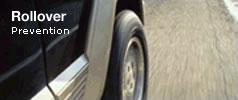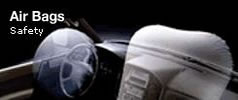|
Medical Conditions
Some individuals may have certain medical conditions where the risks of a deploying air bag exceed the risk of impacting the steering wheel, dashboard or windshield in the absence of an air bag. These individuals may apply for an air bag ON-OFF switch or request the air bag be deactivated. (For either the driver or passenger frontal air bag.)
The list of approved medical conditions is the same whether a consumer is applying for a frontal air bag ON-OFF switch or requesting the frontal air bag be deactivated. NHTSA will only consider requests for deactivation when your vehicle manufacturer does not make an ON-OFF switch available for your particular vehicle.
At NHTSA's request, the Ronald Reagan Institute of Emergency Medicine convened an expert panel of physicians to formulate recommendations on specific medical indications for air bag disconnection (deactivation) at the National Conference on Medical Indications for Air Bag Disconnection (July 16-18, 1997, George Washington Medical Center, Washington, DC). The panel consisted of 17 physicians, each nominated by a professional society or organization. The medical conditions considered were provided by NHTSA as the most common concerns expressed by members of the public in regard to disconnection requests. The panel did not recommend disconnecting bags for pacemakers, supplemental oxygen, eyeglasses, median sternotomy, angina, chronic obstructive pulmonary disease, emphysema, asthma, breast reconstruction, mastectomy, scoliosis (if the person is capable of being positioned properly), previous back or neck surgery, previous facial reconstructive surgery or facial injury, hyperacusis, tinnitus, advanced age, osteogenesis imperfecta, osteoporosis and arthritis (if the person can sit back at a safe distance from the air bag), previous ophthalmologic surgery, Down syndrome and atlantoaxial instability (if the person can reliably sit properly aligned in the front seat), or pregnancy. The panel did, however, recommend disconnecting an air bag if a safe sitting distance or position cannot be maintained by a:
|
Area is Locked
|






